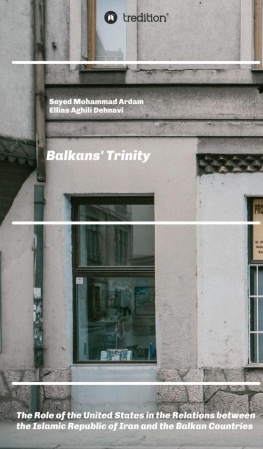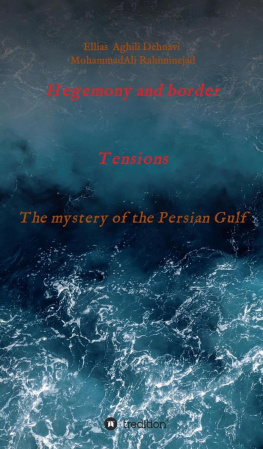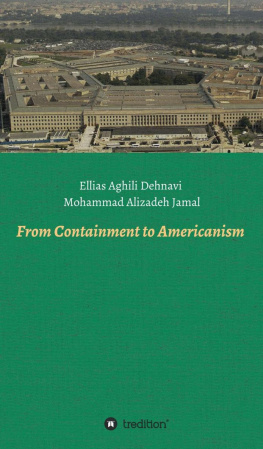Copyright 2021 Seyed Mohammad Ardam, Ellias Aghili Dehnavi
Publisher: tredition GmbH, Halenreie 40-44, 22359 Hamburg, Germany
ISBN
Paperback: 978-3-347-31838-0
Hardcover: 978-3-347-31839-7
eBook: 978-3-347-31840-3
Printed on demand in many countries
All rights reserved. No part of this publication may be reproduced, distributed, or transmitted in any form or by any means, including photocopying, recording, or other electronic or mechanical methods, without the prior written permission of the publisher, except in the case of brief quotations embodied in critical reviews and certain other noncommercial uses permitted by copyright law. For permission requests, write to the publisher.
Balkans Trinity
The Role of the United States in the Relations between the Islamic Republic of Iran and the Balkan Countries
Preface
The Balkans, also known as the Balkan peninsula are a geographic area in southeastern Europe. It is bordered by the Black Sea and the Aegean Sea in the east, the Adriatic Sea and the Greek Sea in the west, the Mediterranean Sea in the south, and by the Dinaric Alps and Transylvanian Alps in the north. The Balkans comprise the areas of Greece, Albania, Bulgaria, Kosovo, Bosnia and Herzegovina, Croatia, Slovenia, Republic of Northern Macedonia, Serbia, Montenegro, Romania, Turkey (the European part). Its total area is 728,000 km2 and the population is about 60, 00,000. The region takes its name from the Balkan Mountains that are extended from central Bulgaria to the eastern region of Serbia.
The great importance of this region in terms of geopolitical, geo-economic, and geostrategic issues has resulted in the regional and supra-regional great powers being interested in this part of Europe and they are making efforts to make an influence in the region in a way that enjoy the interests of this area.
The Islamic Republic of Iran, due to the history of relations with the Balkans, is trying to make an influence in the region and establish a position for itself. The United States (US) as its traditional rival, however, has made efforts to apply its influence in the countries located in the region and prevent the establishment of relations between the Balkan countries and the Islamic Republic of Iran. At the same time, the US is making use of its prominent foreign policy tool (i.e. sanctions) to avert the Islamic Republic of Iran's influence in the Balkans as well as preventing the cooperation between the Balkans with the Islamic Republic of Iran.
Thereby, in this book, we discuss the economic, political, and cultural relations of the Islamic Republic of Iran with the Balkan countries, in addition, we address the effects of U.S. sanctions on the economic, political, and cultural relations of the countries located in this region with the Islamic Republic of Iran.
Abstract
Relations between Iran and the Balkans have always had many ups and downs, and these ups and downs are often influenced by US sanctions against Iran, this prevents countries from better understanding the potential of Iran for a lasting economic relationship. The question that arises in this study is what effect does the confrontation between Iran and the United States have on relations of Iran with the Balkan countries? The research hypothesis indicates that before the heavy US sanctions against Iran, the volume of economic relations between Iran and the Balkan countries amounted to several billion dollars, but with the imposition of sanctions, this volume of relations was reduced to a very low level. In this study, we first describe the theoretical framework of foreign policy from the perspective of James Rosena, and then discuss the potential of the Islamic Republic of Iran and the Balkan countries and the impact of US sanctions on economic relations between them.
Keywords: Foreign Policy, Cold War, Iran, Balkans, USA
Introduction
The outbreak of the Islamic Revolution in Iran posed a major challenge to US foreign policy and had a far-reaching impact on the world, especially in areas under US influence. From the point of view of the world capitalist system (led by the United States of America), Iran is a rough and disruptive member of the international system, and its Islamic ideology always insists on a constant struggle with the liberal values that govern the world system and seeks to disrupt current situation and makes disorder in the current world system. This factor has been one of the serious and basic procedures of the US foreign policy decision-makers after the Islamic Revolution of Iran until now. They used diplomacy, deterrence, blockade, intensification of sanctions and military aggression. Among these, sanctions are of special importance and are one of the international coercive tools of governments to change the behavior and overthrow other governments. The Islamic Republic of Iran has been subject to unilateral sanctions by the United States and Western countries since its realization, and during the last four decades, it has gradually entered the gradual process of the most severe sanctions of the international system. These sanctions have also affected relations of Iran with other countries and have made other countries fearful and hesitant in establishing relations with the Islamic Republic of Iran. In this study, we examine the role of the United States in the relations between the Islamic Republic of Iran and the Balkan countries, in the meantime, we examine the impact of US sanctions on the relations of these countries with Iran.
Theoretical Framework
Foreign policy
The beginning of foreign policy field was usually sparked by three main sources: James Rosena's article "Pre-Theories and Theories of Foreign Policy", Richard Snyder et al. book "Pre-Decision as an Approach to the Study of International Politics" and Harold and Margaret Sprout's book "Human Suitable Hypotheses _ Environment within the international arena". If we want to give a general definition that includes foreign policy in general and in particular, we explain that: Foreign policy, which includes the regulation, implementation, as well as the product and result of decisions, is a guide for actions that a the government acts beyond its borders to advance its goals considering governmental actors. Although, in principle, the patterns of behavior and interactions in international politics should be evaluated in the context of the foreign policy of various actors, but neglect and inattention to this field of study has led to a lack of sufficient and comprehensive explanations of foreign policy. (Qawam, 2013: 231) Therefore, the main and primary task of a policymaker is to fully explain foreign policy in the first place and determine the hierarchy of goals, interests and then evaluate the reaction of other governments to these priorities in the second place. Therefore, in the policymaking process, in addition to explaining it, goals, interests and strategies should be considered, as well as the hierarchy that others attribute to their goals, interests and strategies. Given the above explanations, it is necessary to have a model for studying foreign policy, because by using a specific model, policymakers will be able to view, understand and interpret the behavior of others. For this reason, we have considered the model for the study of foreign policy as the Rosena model, using the components of this model such as: individual component, role component, society component, government system component and international (systemic) system component, an analysis of Iran foreign policy in the Balkans after the Cold War can be done.













